- Skip to main content
- Keyboard shortcuts for audio player

Search Trends
- Learn Chinese
EXPLORE MORE
DOWNLOAD OUR APP
Copyright © 2023 CGTN. 京ICP备16065310号

Disinformation report hotline: 010-85061466
- Terms of use
- Privacy policy

HAVANA — China is willing to work with Cuba to implement the important consensus reached by top leaders of the two parties and countries, and continue to support each other on issues concerning each other's core interests, said a senior official of the Communist Party of China (CPC) during his visit to Cuba.
Li Xi, a member of the Standing Committee of the Political Bureau of the CPC Central Committee, made the remarks when meeting with First Secretary of the Central Committee of the Communist Party of Cuba (PCC) and Cuban President Miguel Diaz-Canel .
The two sides also witnessed the signing of a memorandum of understanding on cooperation between China's National Commission of Supervision and the Office of the Comptroller General of Cuba
Li paid an official friendly visit to Cuba from Saturday to Monday.
READ MORE : Cuban summit calls for global multilateralism
China stands ready to promote the development of the respective party building and socialist cause, said Li, also secretary of the CPC Central Commission for Discipline Inspection.
China is also willing to work with Cuba to promote the implementation of the Global Development Initiative, the Global Security Initiative and the Global Civilization Initiative, as well as the building of a community with a shared future for mankind, he added.
Conveying cordial greetings of Xi Jinping, general secretary of the CPC Central Committee, to Diaz-Canel, Li extended congratulations on Cuba's success in hosting the Summit of the Group of 77 and China in Havana.
Li said that the two meetings between Xi and Diaz-Canel after the 20th CPC National Congress pointed out the direction for the development of relations between the two parties and countries.
For his part, Diaz-Canel asked Li to convey his sincere greetings to General Secretary Xi, and expressed a warm welcome to Li for his visit as the special representative of President Xi.
China has firmly stood with the Global South nations and effectively safeguarded the common interests of developing countries, said Diaz-Canel, noting that the Cuban side thanks China for its assistance to Cuba's economic and social development and is ready to maintain close friendly exchanges with the CPC and promote practical cooperation.
Diaz-Canel also expressed gratitude for China's firm support for the Cuban people's just struggle against unilateral blockade and sanctions, saying that Cuba firmly supports the major global initiatives proposed by Xi. He also wished the third Belt and Road Forum for International Cooperation a complete success.
During the meeting with Roberto Morales Ojeda, member of the Political Bureau and secretary of organization of the PCC Central Committee, the two sides agreed to strengthen political mutual trust and strategic coordination, deepen practical cooperation in various fields, and strengthen exchanges and mutual learning on governance and experience sharing and cooperation in party management and anti-corruption.
The two sides also witnessed the signing of a memorandum of understanding on cooperation between China's National Commission of Supervision and the Office of the Comptroller General of Cuba.
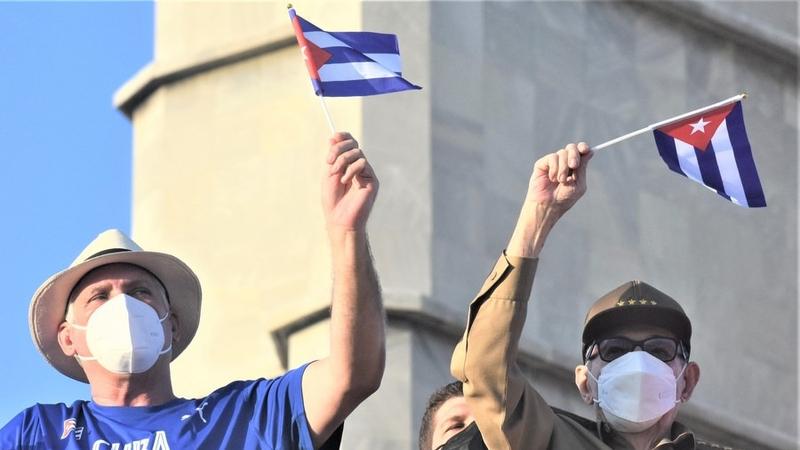
When visiting Raul Castro, the leader of Cuba's socialist revolution, Li conveyed Xi's greetings to Raul and said that the traditional friendship between China and Cuba was forged and carefully cultivated by the older generation of leaders of the two countries. Raul is a close friend of the CPC and the Chinese people and has made historic contributions to the development of relations between the two parties and the two countries. Facing the complex and ever-changing international situation, China is willing to work with Cuba to jointy build a China-Cuba community with a shared future.
Raul Castro asked Li to convey his greetings to Xi. He recalled his exchanges with Chinese comrades, saying that Cuba is happy and encouraged by the great achievements made in the cause of socialism with Chinese characteristics and is willing to learn from China's development experience. He also visited the Fidel Castro Ruz Center with Li.
READ MORE : China, Cuba sign agreements to boost biotechnology cooperation
During Li's visit to Cuba, he introduced the full and rigorous self-governance and anti-corruption work of the CPC under the strong leadership of General Secretary Xi and the CPC Central Committee.
Li told the Cuban side that China has successfully embarked on a path of anti-corruption that relies on institutional strengths and the rule of law, while the CPC has become stronger and more powerful and won the heartfelt support of the people.
The Cuban side spoke highly of the remarkable achievements made by the CPC in party building and anti-corruption and expressed willingness to deepen exchanges with the Chinese side on party governance, discipline inspection and supervision.

China welcomes Cuban PM's visit, ready to deepen ties: spokesperson
Source: Xinhua
Editor: huaxia
2023-11-01 19:30:45

BEIJING, Nov. 1 (Xinhua) -- China welcomes Cuban Prime Minister Manuel Marrero's visit to the country from Nov. 2 to 9, and his attendance of the 6th China International Import Expo (CIIE), Foreign Ministry Spokesperson Wang Wenbin said on Wednesday.
Wang made the remarks at a daily press conference when responding to a related query, adding that China will take the visit as an opportunity to deepen ties with Cuba.
This will be Marrero's first visit to China since he took office as prime minister. Chinese leaders will meet and hold talks with him to exchange in-depth views on bilateral relations, as well as international and regional issues of common interest, the spokesperson said.
Prime Minister Marrero's visit to China is of great significance to further implementing the important consensus reached by the two heads of state and deepening China-Cuba relations, said Wang, noting that there have been three important high-level exchanges between the two countries since Cuban President Miguel Diaz-Canel's state visit to China last November.
"China and Cuba are good friends walking hand in hand, and good comrades who have similar ideals and beliefs," Wang said.
China is willing to work with Cuba to take this visit as an opportunity to deepen the special friendly relations between China and Cuba in the new era, and to jointly build a community with a shared future with Cuba, Wang added. ■

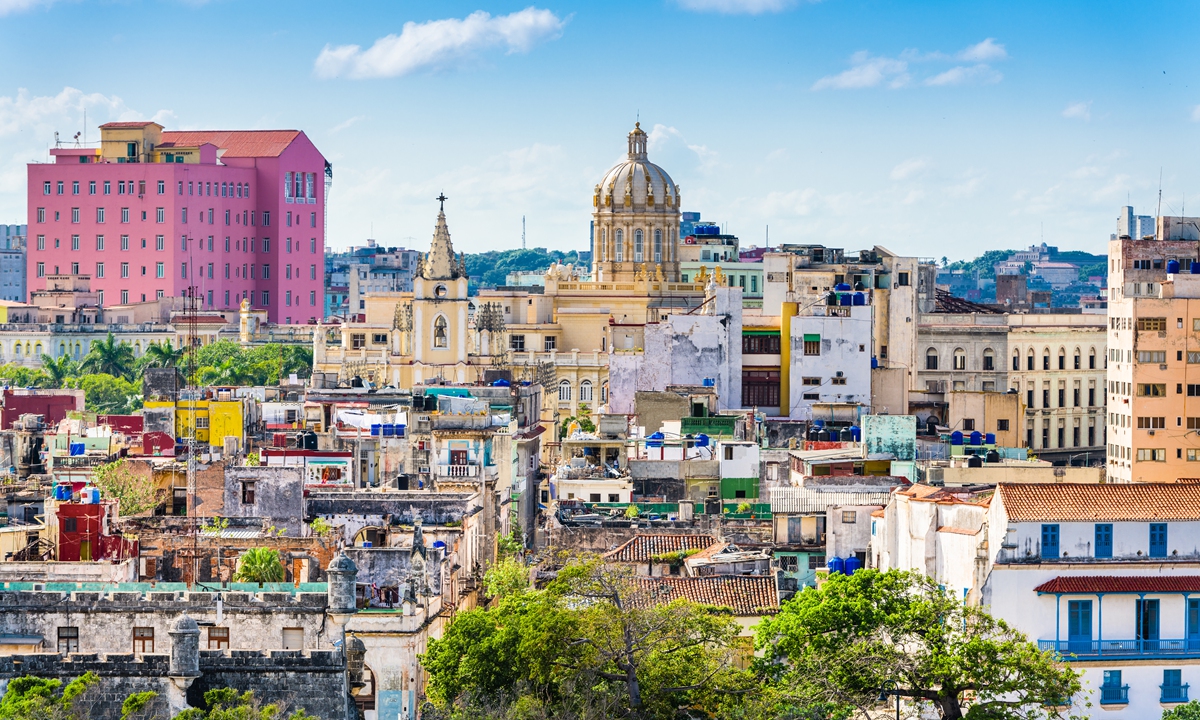
City view of Havana, capital of Cuba Photo: VCG
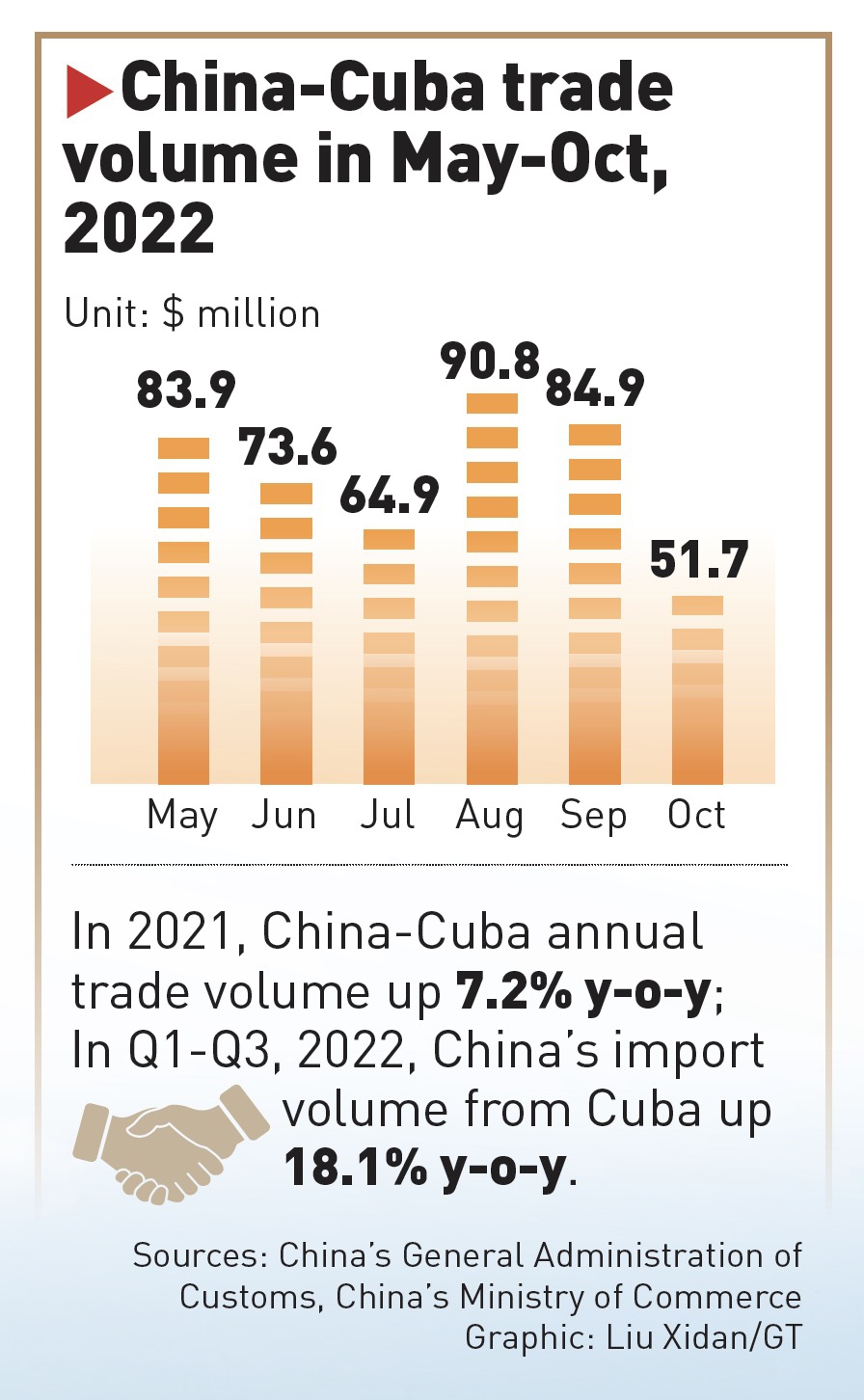
Graphic: Liu Xidan/GT
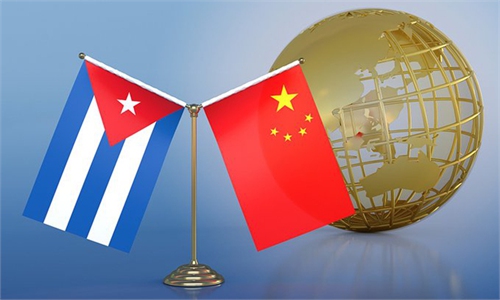
At the invitation of General Secretary of the Communist Party of China (CPC) Central Committee and Chinese President ...
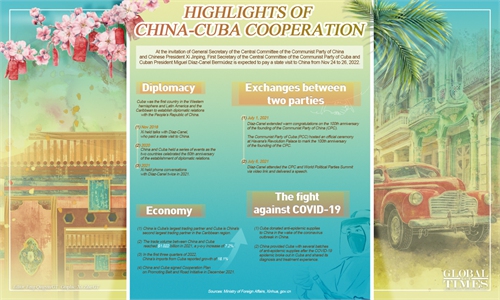
First secretary of the Central Committee of the Communist Party of Cuba and Cuban President Miguel Díaz-Canel Bermúdez ...
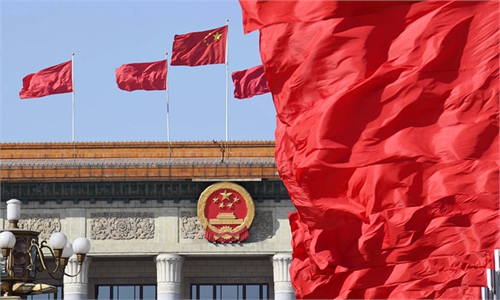
China on Thursday received visiting Cuban President Miguel Diaz-Canel Bermudez and is scheduled to host Mongolian President Ukhnaa ...

- Cuban president's China visit will boost bilateral relations: foreign ministry
BEIJING, Nov. 21 (Xinhua) -- The Cuban president's upcoming visit to China is expected to inject new impetus into bilateral relations and promote the traditional friendship and sound cooperation, a Chinese foreign ministry spokesperson said here Monday.
At the invitation of General Secretary of the Communist Party of China (CPC) Central Committee and Chinese President Xi Jinping, First Secretary of the Central Committee of the Communist Party of Cuba and Cuban President Miguel Diaz-Canel Bermudez will pay a state visit to China from Nov. 24 to 26.
Noting that Cuba is the first Latin American and Caribbean country that established diplomatic relations with the People's Republic of China, Mao Ning, the spokesperson, said China and Cuba are good friends, good comrades and good brothers who trust each other and share a common future.
In the past 62 years since the establishment of diplomatic ties, China and Cuba have worked hand in hand to build socialism with their own characteristics, supported each other on issues concerning their respective core interests, and cooperated closely on international and regional affairs, setting an example of solidarity and cooperation between socialist countries and sincere mutual assistance between developing countries, Mao said.
She said President Diaz-Canel will be the first Latin American and Caribbean head of state to be received by China since the 20th National Congress of the CPC held last month.
"It is believed that President Diaz-Canel's visit will inject new impetus into the development of China-Cuba relations and push forward the traditional friendship and friendly cooperation between the two countries," she said. Enditem
Go to Forum >> 0 Comment(s)
Add your comments....
- User Name Required
- Your Comment
- Asia Briefing
- China Briefing
- ASEAN Briefing
- India Briefing
- Vietnam Briefing
- Silk Road Briefing
- Russia Briefing
- Middle East Briefing
China-Cuba: Bilateral Trade and Investment Prospects
The state visit of Miguel Díaz-Canel, First Secretary of the Central Committee of the Communist Party of Cuba and Cuban President, marks a new historic chapter in China-Cuba relations. As the two countries plan the development of their cooperation against the background of the COVID-19 pandemic and global uncertainties, we discuss the existing bilateral trade and investment relations. China is among Cuba’s major trade partners and is actively involved in its development. On the other hand, Cuba is an active member of the Belt and Road Initiative. The two countries share close cooperation in infrastructure, technology, science, tourism, and energy.
The pragmatic cooperation between China and Cuba is achieving all-around development. China is one of Cuba’s main trade partners and has actively contributed to the country’s economic and social development. Cuba was the first nation in Latin America to establish diplomatic ties with China, and it has long been in the lead among its neighbors in forging ties with China. The two sides are consistently advancing initiatives in crucial sectors like infrastructure, technology, agriculture, tourism, energy, and biotechnology, highlighting the enormous potential of China-Cuba Belt and Road cooperation.
China-Cuba relations
On September 28, 2020, China and Cuba celebrated the 60th anniversary of their diplomatic relations, an event whose significance also applies to China’s relations with the rest of Latin America and the Caribbean regions.
In terms of historical development, the revolutions carried on by both countries over the past century mirrored one another in a wide range of contexts, including foreign policy, ideology, science, and technology.
Nowadays, China has grown to become Cuba’s largest trading partner, a key source of funding, and the primary provider of technology for the execution of projects prioritized for the country’s economic and social development. On the other hand, Cuba is beginning to establish itself as a reliable supplier of rum, lobster, sugar, nickel, and tobacco for the Chinese market.
Numerous Chinese companies are working on several projects in Cuba, many of which are related to the development and modernization of the country’s infrastructure, telecommunications, renewable energy sources, the tourism industry, and other key areas.
Since the outbreak of COVID-19 in 2020, China and Cuba have actively carried out anti-epidemic cooperation. After the emergence of COVID-19 in Cuba, China helped Cuba with many batches of medical materials and shared experiences in diagnosis and treatment.
The role of Cuba in the Belt and Road Initiative
In 2018, China and Cuba signed a memorandum of understanding (MoU) to jointly advance the development of the Belt and Road Initiative (BRI). Three years later, at the end of 2021, the chairman of China’s National Development and Reform Commission (NDRC) and Cuba’s deputy prime minister signed a plan to jointly promote the construction of the BRI , making the cooperation’s direction and key areas even clearer.
In particular, the “Health Silk Road” and the creation of the “Digital Silk Road” hold great promise for the two countries. These sectors of their bilateral cooperation span a wide range of industries, including electronics, textiles, energy, agriculture, information, genetic engineering, medicine, and health.
Green and digital transformation are two other important fields of cooperation for China and Cuba, considering both countries’ efforts toward achieving sustainable development. Specifically, energy has long represented the goal of Cuba’s socioeconomic development strategy. By 2030, the country plans to have 24 percent of its electricity supply come from renewable sources. Within the same period, China proposed to achieve carbon neutrality.
In 2021, Cuba officially joined the “Belt and Road Energy Partnership” (BREP) , which promotes cooperation in the energy sector that benefits both parties, aids nations in solving problems associated with energy development, achieve common development and prosperity, and makes positive contributions to the creation of a world community with a “shared future for mankind.” Since then, the two countries have signed several construction and energy deals , with the goal of generating momentum for continued cooperation between China and Latin America by utilizing the complementary strengths of both parties.
China-Cuba bilateral trades
In recent years, the bilateral trade between China and Cuba has maintained good momentum. At present, China is Cuba’s largest trading partner, and Cuba is China’s second-largest trading partner in the Caribbean region. In 2021, the trade volume between China and Cuba reached US$1.02 billion, a year-on-year increase of 7.2 percent, of which China’s exports to Cuba reached US$576 million, a year-on-year increase of 19.2 percent. In Q1-Q3 2022, China’s import volume from Cuba grew by 18.1 percent year-on-year.
In 2021, the top exports from Cuba to China included ores, slag, and ash (US$153.1 million), nickels and articles thereof (US$151.8 million), sugars and sugar confectionery (US$89.1 million), fish, crustaceans, and mollusks (US$39.1 million), tobacco and manufactured tobacco substitutes (US$5.2 million).
In 2021, the top exports of China to Cuba included electrical machinery and equipment, sound recorders and reproducers, television image and reproducers, and other components (US$133.3 million), machinery, mechanical appliances, and nuclear reactors (US$103.6 million), vehicles and accessories (US$48.7 million), pharmaceutical products (US$28.8 million), and iron and steel (US$24.6 million).
China-Cuba bilateral investment and cooperation
According to data from China’s Ministry of Commerce (MOFCOM), Chinese investment flows into Cuba reached US$11.4 million in 2020, while total Chinese direct investment stock reached US$140 million.
That same year, Chinese-invested enterprises signed 37 new underwriting projects in Cuba with a total new signed contract value of US$314 million and a completed turnover of US$142 million. At the end of 2020, there were a total of 383 Chinese laborers working in Cuba.
In January 2015, the state-backed China Communications Construction Company Limited (CCCC) won the contract to modernize the port of Santiago de Cuba , which is the main maritime facility on the eastern side of the island, and the country’s second-largest port after Mariel near Havana. This was the first Cuban infrastructure project underwritten by a Chinese Company. Chinese government aided this multi-purpose wharf project, with a total contract value of US$ 120 million. The construction was completed in June 2019 .
Energy and natural resources
Due to its relatively small size and limited natural resources, Cuba is reliant on imports to meet its energy needs. As such, it actively collaborated with other countries to help meet its energy needs, both through international trade and through expanding energy projects at home.
China and Cuba have collaborated on energy projects for many years. As mentioned earlier, Cuba officially joined the BREP in 2021.
Chinese companies have been invested in Cuba’s energy industry for many years. Great Wall Drilling, a subsidiary of China National Petroleum Corp (CNPC), has been active in the country since 2005 and is a key contractor for the drilling of Cuba’s oil wells .
To secure its energy security, Cuba is now also seeking to increase the share of renewable energy in its share of energy consumption, setting a target of 24 percent by 2030. China and Chinese companies will likely have a large role to play in Cuba’s energy transition, with several renewable projects already underway.
In 2019, construction began on the Mariel Solar project, a joint venture photovoltaic energy project between Shanghai Electric’s subsidiary SE Energy Investment and UK-based Hive Energy . The 62MW solar park, which is based in the Mariel Special Development Zone (ZED Mariel), was reportedly successfully connected to the grid for power generation in 2021.
Despite its relatively limited natural resources, Cuba does have stores of minerals such as nickel and chrome, which are in high demand in China. As such, China’s mineral and mining companies, such as China Minmetals Corp, have long had a presence in the island nation.
Biotechnology and pharmaceuticals
Over the past two decades, the bilateral cooperation between China and Cuba in the areas of biotechnology and pharmaceuticals has seen steady development with impressive results.
On November 22, 2004, the two countries signed an MoU to acknowledge the advancement of their cooperation in this sector. This MoU was renewed in 2009 and expanded during President Xi Jinping’s visit to Cuba in July 2014 .
In 2019, the NDRC of China and the Council of State of Cuba jointly organized the 10th Joint Working Group on Biotechnology meeting in Havana. Working sessions were held in the fields of industry and biotechnology, science and technology, regulatory affairs, agriculture, and health. On that occasion, the MoU between BioCubaFarma (Cuba’s organization in charge of coordinating national efforts in the biomedical sector) and NDRC was extended for another five years. Of the 100 research and development projects that the company was working on at the time, 20 of them were allocated to Chinese counterparts.
As a result of this cooperation, three joint ventures —Biotech Pharmaceutical Co., Ltd in Beijing, Changchun Heber Biological Technology Co., Ltd in Jilin province, and Shandong Lukang Heber Co., Ltd in Shandong province— made particular contributions in the fields of human health and agriculture.
BioCubaFarma has thus far registered four products in China:
- Nimotuzumab, a humanized monoclonal antibody from Biotech Pharmaceutical for the treatment of nasopharyngeal cancer and other tumors, which has helped more than 50,000 Chinese patients and is now pursuing approval for two additional tumor indications (head and neck and esophagus).
- Human recombinant interferon alpha 2b for the treatment of Hepatitis B and C, from Changchun Heber Biological Technology Co., Ltd.
- Ateromixol (PPG) for hypercholesterolemia, from Hubei China- Cuba Biopharmaceutical Co., Ltd.
- Aikexian, a biofertilizer from JV Shandong Lukang Heber Biotechnology Co., Ltd.
In the New East Lake High-tech Zone in Wuhan , there is also a Cuba-China industrial complex for the production of PPG and other natural goods. Similar to this, Cuba announced the joint development of the first joint biotechnology park with China , to be built in Fangchenggang, in China’s Guangxi province, led by the joint efforts of BioCubaFarma and Guangxi Fukang. The park is expected to become an experimental industrial hub in drug research and procurement for China and the whole ASEAN region.
Science and technology
In sectors of mutual interest, Cuba and China have long-standing cooperative interactions. The two countries established a Joint Commission for Scientific and Technical Cooperation to evaluate and coordinate the compliance with cooperation programs as a result of the Agreement of the Scientific and Technical Cooperation between the Governments of the Republic of Cuba and the People’s Republic of China, signed in Beijing as early as 1989.
The most recent Joint Committee was held in 2019. Both parties had the chance to look back on accomplishments in the areas of brain research, biomedicine, and other cooperative endeavors. The meeting’s final minutes listed the key areas for future cooperation to foster and conduct in-depth discussions on issues, such as cooperation between scientific parks, personnel exchanges, and support for collaborative research.
A good example of this collaboration is the Brain Mapping Project, jointly carried out by Cuba, China, and Canada, which has been extended for another three years as a result of its ground-breaking findings.
Another noteworthy accomplishment is the Joint Cuba-China Laboratory for Frontier Research in Translational Neuroethology at the University of Science and Electronic Technology of China (UESTC) in Chengdu, which conducts research on the early detection, intervention, and rehabilitation of numerous neurodegenerative diseases and mental disorders.
Another area of cooperation between Cuba and China is tourism. This is a natural partnership. Tourism accounts for around 10 percent of GDP, reaching a total of US$12.16 billion in 2019, prior to the pandemic. Meanwhile – prior to the pandemic – China was one of the world’s major sources of international tourists, with a total of 155 million outbound tourists in 2019.
China’s Trip.com Group, a leading Chinese online travel agency, also signed an MoU with the Cuban Ministry of Tourism in 2019, and in 2021 received the Cuban Consul General in Shanghai to explore opportunities to promote Cuba as a tourist destination to Chinese consumers.
As it currently stands, China’s COVID-19 curbs and quarantine requirements for inbound travelers will continue to stymie outbound tourism to any part of the world, including Cuba. However, once China does decide to lift restrictions – and it has been gradually doing so in recent months – we expect to see a wave of Chinese tourists who are eager to travel the world again. Given the close ties between the two countries and Cuba’s legacy as a tourist destination for Chinese travelers, the country will be ready to receive them.
China-Cuba investment and trade agreements
China and Cuba have signed two bilateral treaties to facilitate investment and business exchange between the two countries. These are a bilateral investment treaty (BIT) and a double taxation avoidance (DTA) treaty.
Bilateral investment treaty
The China-Cuba BIT , signed in 1995, guarantees protection to investors and their investments of both contracting countries in the other contracting country. This is codified in the most-favored-nation (MFN) clause, which also ensures that investors from the other contracting country receive the same treatment as that extended to investors from each party’s own country and investors from a third country.
Investors covered by the BIT include:
- Citizens of the PRC and Cuba; and
- Companies legally established within the territories of the PRC and Cuba.
Meanwhile, investments covered by the BIT include:
- Movable and immovable property and other property rights such as mortgages and pledges;
- Shares, stocks, and other types of participation in companies;
- Claims to money or to any other performance with economic value;
- Copyrights, industrial property, know-how, and technological processes; and
- Concession conferred by law including concessions for exploration and exploitation of natural resources.
The BIT also guarantees investors from both countries the right to transfer profits derived in the other contracting party’s territory back to their home country. This includes the transfer of profits, dividends, interests, and other income, money from partial liquidation of investment, payables pursuant to loan agreements related to investments, and royalties.
The BIT includes articles on dispute mechanisms, including litigation in a neutral international tribunal.
In addition to guaranteeing the protection of investments, the BIT also requires both countries to take measures to encourage and facilitate bilateral investment, which includes ensuring there are facilities for citizens of the other party to obtain a visa to travel to and engage in business in the other party’s country.
Double taxation avoidance agreement
In 2001, China and Cuba signed a DTA to prevent investors operating in the other party’s country from having to pay tax on profits and income twice.
The DTA covers the following taxes in China:
- Individual income tax (IIT)
- Income tax of foreign enterprises and foreign-invested enterprises
Meanwhile, the Cuban taxes covered by the treaty are:
Foreign companies with a permanent establishment in Cuba are taxed at a rate of 35 percent, while those without a permanent establishment are taxed at 4 percent. Cuba imposes a progressive IIT rate of 15 to 50 percent.
To understand China’s tax regime, see our country portal here .
Under the DTA, business profits are only taxed in the country in which the company has a “permanent establishment”, except in cases where the company has a permanent establishment and conducts business in the other country as well. In this case, only the profits that are attributable to each country’s permanent establishment are taxed by the relevant country.
A company has a “permanent establishment” if it has any of the following in one of the contracting countries:
- A place of management
- A mine, an oil or gas well, a quarry, or any other place of extraction of natural resources
It also includes:
- A building site, a construction, assembly, or installation project, or supervisory activities in connection therewith, but only where such site, project, or activities continue for a period of more than twelve months.
- The furnishing of services, including consultancy services, by an enterprise of a Contracting State through employees or other engaged personnel in the other Contracting State, provided that such activities continue for the same project or a connected project for a period or periods aggregating more than 12 months within any 24-month period.
The DTA also ensures that a company’s profits derived from international shipping or aircraft are taxed only in the company’s home country. That means a Chinese company’s profits from international shipping will not be taxed in Cuba, and vice versa. This also applies to profits from the participation in a pool, a joint business, or an international operating agency.
Multilateral treaties
China and Cuba are both WTO members, which by extension means they are both parties to a range of multilateral agreements on trade and investment. These treaties include:
- The Agreement on Trade-Related Aspects of Intellectual Property Rights ( TRIPS ), requires WTO members to extend intellectual property (IP) rights to the IP owners in any member state or region. It includes a most-favored-nation (MFN) clause, guaranteeing equal treatment for IP rights protection for all member countries and regions, and offers dispute resolution and compensation mechanisms.
- Agreement on Trade-Related Investment Measures ( TRIMs ), which prohibits members from implementing investment measures that have the effect of restricting trade with other members, such as local content requirements (requirements for a company to use locally-produced goods or local services in order to operate in the market).
- General Agreement on Trade in Services (GATS), which guarantees MFN status to service providers of any WTO member (except governmental services such as social security schemes, public health, education, and services related to air transport).
Conclusion and future prospects
China and Cuba have deep routes that can be traced many decades back to the two countries’ shared history and ideology as communist countries. Over the past few decades, as China has risen as a global economic power, the relationship has continued to deepen, with many new areas of cooperation being explored and developed.
The two countries also have a synergistic relationship in various fields. For instance, Cuba’s world-leading healthcare industry can be of considerable help to China as it seeks to improve its capabilities and support a rapidly aging population. Meanwhile, China’s considerable expertise and resources in infrastructure development can boost Cuba’s economic development and improve opportunities for Cuba’s citizens.
With the high-level visit of the Cuba leader to China, new momentum will be injected into China-Cuba bilateral relations, and more cooperation is expected between the two countries.
China Briefing is written and produced by Dezan Shira & Associates . The practice assists foreign investors into China and has done so since 1992 through offices in Beijing, Tianjin, Dalian, Qingdao, Shanghai, Hangzhou, Ningbo, Suzhou, Guangzhou, Dongguan, Zhongshan, Shenzhen, and Hong Kong. Please contact the firm for assistance in China at [email protected] .
Dezan Shira & Associates has offices in Vietnam , Indonesia , Singapore , United States , Germany , Italy , India , and Russia , in addition to our trade research facilities along the Belt & Road Initiative . We also have partner firms assisting foreign investors in The Philippines , Malaysia , Thailand , Bangladesh .
- Previous Article China’s Economic Roundup: October 2022
- Next Article How Long Does it Take to Register a Company in China and the UK?
Our free webinars are packed full of useful information for doing business in China.

DEZAN SHIRA & ASSOCIATES
Meet the firm behind our content. Visit their website to see how their services can help your business succeed.
Want the Latest Sent to Your Inbox?
Subscribing grants you this, plus free access to our articles and magazines.
Get free access to our subscriptions and publications
Subscribe to receive weekly China Briefing news updates, our latest doing business publications, and access to our Asia archives.

Your trusted source for China business, regulatory and economy news, since 1999.

Subscribe now to receive our weekly China Edition newsletter. Its free with no strings attached.
Not convinced? Click here to see our last week's issue.

Search our guides, media and news archives
Type keyword to begin searching...
- Español
- Français
- Português

HAVANA, MAY 2, 2024
OFFICIAL VOICE OF THE COMMUNIST PARTY OF CUBA CENTRAL COMMITTEE
China and cuba, for a community of shared future.
China is willing to work with Cuba as companions of socialism, good partners for common development and good comrades in strategic coordination
Author: Ma Hui | [email protected]
april 22, 2024 08:04:44

In 2013, President Xi Jinping put forward the concept of building a community of shared future of mankind, which represents the greatest common denominator of all peoples, in the desire to build a better world. It has far-reaching theoretical value and historical significance, and is showing increasingly strong influence, vitality and convening power. China and Cuba are joining together to build a Sino-Cuban community of shared future, injecting an important impetus to the development of bilateral relations. They are two good friends, close partners and intimate brothers. In November 2022, the General Secretary of the Central Committee of the Communist Party of China and President of the Republic, Xi Jinping, held talks at the Great Hall of the People with the First Secretary of the Central Committee of the Communist Party of Cuba and President of the Republic, Miguel Díaz-Canel Bermúdez, who was in Beijing on a state visit. The two leaders had an in-depth exchange of views on the relations between the two parties and countries, as well as on international and regional issues of common interest, and expressed that they would continue to promote the implementation of the consensus reached, and agreed to continue deepening friendly and special relations in the new era, promoting the construction of a community of shared future between China and Cuba, in the process of building a community of shared future of mankind. Senior Cuban Party and government officials affirmed that Cuba is a beneficiary and firm supporter of this concept, and is willing to work with China, hand in hand, to promote the building of such a community of shared future between the two countries. Mutual political trust continues to deepen. China regards and develops the special friendly relations between the two parties and countries from a strategic and comprehensive perspective, and adheres to the guideline of long-term friendship. In August 2023, when President Xi Jinping met with President Miguel Díaz-Canel Bermúdez in Johannesburg, South Africa, he assured that China is willing to further deepen mutual political trust, expand practical cooperation and intensify strategic coordination with Cuba, so as to promote the continuous development of special friendly relations between the two sides. The high-level leaders of the two parties and countries have maintained political dialogue and friendly exchanges through official visits, sharing in-depth experiences on bilateral cooperation and party and country governance, and actively implementing the consensus reached by the two heads of state. Practical cooperation between China and Cuba continues to be strengthened. The two sides co-chaired the 30 session of the Intergovernmental Joint Commission on Economic and Trade Relations to plan bilateral economic and trade cooperation and promote the joint construction of the high-quality Belt and Road between the two countries. Cuba attaches great importance to the China International Import Expo, and has participated in it for many consecutive years. Honey, tobacco, rum and other high-standard Cuban products have entered the Chinese market through e-commerce platforms, and are well received by Chinese consumers. The two countries have jointly built the largest and most advanced floating dock in Cuba and the Caribbean, which has improved the development level of the Cuban shipping industry, and increased economic and social benefits. The two sides are actively cooperating in fields such as biotechnology and new energies. Photovoltaic power plants and biomass power plants invested by China have helped Cuba's energy security, economic development and improved the livelihoods of its people. Domestic solar photovoltaic power generation systems and LED lights, with China's help, have alleviated the electricity deficit among residents in remote areas of Cuba. The two nations share both joys and adversities. Whether in the face of the COVID-19 pandemic, or against economic and social hardships, China has always provided assistance to Cuba, a testament to the deep friendship and mutual support between the two peoples. This friendship continues to consolidate. Cultural and educational exchanges and cooperation between the two sides are enriching. Chinese language courses have been officially introduced in Cuban universities and high schools. The "passion for the Chinese language" continues to gain momentum in Cuba. The two sides have organized special exhibitions such as Pure Colors-Chinese Porcelain Exhibition and Happy Chinese New Year 2024 at the National Museum of Decorative Arts in Havana. Local and friendly organizations of the two countries have strengthened exchanges. The hearts of the Chinese and Cuban people are closer and their affection is deeper. Looking ahead, China is willing to work with Cuba as companions of socialism, good partners for common development and good comrades in strategic coordination, promote the continuous new development of special friendly relations between the two parties and countries, and build together a community of shared future between the two nations. *The author is the Ambassador of the People's Republic of China in Cuba.

Central Report to the Eighth Congress of the Communist Party of Cuba
Full text of the presentation by Army General Raúl Castro Ruz, April 16, 2021
Recommended
The u.s. government, an accomplice of terrorists, accuses cuba of terrorism.

Cuba presents UN resolution demanding an end to U.S. blockade.

The world reacts to Cuba’s demand: 184 nations against the U.S. blockade!
Press directory:, publications online.
Juventud Rebelde | Trabajadores. | Cubadebate | AIN | Prensa Latina | Opciones | CubaSi | Cubahora | Cubaperiodistas
Bohemia | Cuba Socialista | Mujeres | Tricontinental | La Jiribilla | Alma Mater | Caimán Barbudo | Juventud Técnica | Pionero
TV Cubana | Radio Cubana | Radio Habana Cuba | Radio Progreso | Radio Rebelde | Radio Reloj | Radio Taino | Radio Musical Nacional
Partido Comunista de Cuba | Sitio oficial del Gobierno de la República de Cuba | Ministerio de Relaciones Exteriores | Aduana

GRANMA © 2014 | Founded October, 3, 1965 | ISNN 0864-0424 | General Suárez & Territorial, Plaza de la Revolución, La Habana. Cuba | Telephone: 881-3333
- Share full article
Advertisement
Supported by
China to Build Station That Could Spy on U.S. from Cuba, Officials Say
The planned facility could amplify Beijing’s technological capacity to monitor military operations across the Southeastern states.

By Karoun Demirjian and Edward Wong
Reporting from Washington
China is planning to build a facility in Cuba that U.S. officials are concerned could be capable of spying on the United States by intercepting electronic signals from nearby U.S. military and commercial facilities, according to three U.S. officials familiar with the agreement.
Beijing has built listening outposts elsewhere and has a military presence in Cuba, but an eavesdropping station could give China a foothold about 100 miles from the Florida coastline, from which it could potentially conduct surveillance operations against the United States.
The proximity of the planned facility to the United States is particularly concerning, officials said, because it could amplify Beijing’s technological capacity to monitor sensitive operations across the Southeastern states, including several military bases.
“We are deeply disturbed by reports that Havana and Beijing are working together to target the United States and our people,” Senators Mark Warner, Democrat of Virginia, and Marco Rubio, Republican of Florida, who lead the Senate’s Intelligence Committee, said in a joint statement on Thursday. “The United States must respond to China’s ongoing and brazen attacks on our nation’s security.”
The details of China’s and Cuba’s negotiations — which U.S. officials described on the condition of anonymity to discuss sensitive intelligence — come as the Biden administration has attempted to stabilize relations with Beijing, its main strategic rival, after a period of rising tensions. The Wall Street Journal first reported on plans to build a facility in Cuba.
President Biden’s National Security Council pushed back against reports of the planned facility. “This report is not accurate,” John Kirby, the council spokesman, said in a statement, declining to go into further detail. “We have had real concerns about China’s relationship with Cuba, and we have been concerned since Day 1 of the administration about China’s activities in our hemisphere and around the world.”
Mr. Kirby said that the administration was closely monitoring those activities and taking steps to counter them. He added that “we remain confident that we are able to meet all our security commitments at home and in the region.”
Several diplomatic, military and climate engagements between the two countries were frozen last year after former Speaker Nancy Pelosi’s visit to Taiwan. Bilateral relations had a further setback earlier this year when a Chinese spy balloon was caught traversing the United States, hovering near sensitive military sites.
The incident inspired a backlash from Congress and prompted Antony J. Blinken, the secretary of state, to cancel a scheduled trip to Beijing in February. Mr. Blinken plans to make the trip soon, according to U.S. officials, after weeks of intense diplomacy that included a meeting between Jake Sullivan, the national security adviser, and a senior Chinese official, Wang Yi. It is unclear if the latest revelations about the planned facility in Cuba could affect the visit once again.
Representatives for the Central Intelligence Agency and the Office of the Director of National Intelligence declined to comment.
Carlos Fernández de Cossio, a foreign ministry official in Cuba, said that reports of plans to build a Chinese spy base in the country were “totally false and unfounded.” A representative for the Chinese embassy said Beijing was “not aware of the case.”
China and the United States routinely conduct surveillance operations on one another. The United States sends surveillance flights over the South China Sea, deploys military assets in allied host nations around the Pacific and sells and supplies arms to Taiwan, a democratic island that the Chinese government considers part of its territory.
American officials have accused China in recent years of ambitious hacking attacks against the U.S. government and corporations, trying to recruit agents and assets inside and outside the United States and monitoring and threatening Chinese dissenters overseas.
That Beijing appears to be pursuing a closer arrangement with Cuba is not itself surprising, analysts say. The two countries have forged increasingly close ties since the end of the Cold War. China is Cuba’s largest trading partner, and plays a role in the island’s agricultural, pharmaceutical, telecommunications and infrastructural industries. Beijing also owns a significant measure of Havana’s foreign debt.
Cuba’s proximity to the United States has long made it a desirable strategic foothold for U.S. adversaries, perhaps most famously during the Cuban Missile Crisis, when the Soviet Union made and then backed down from plans to place nuclear missiles on the island nation. Today, the United States has a largely inimical relationship with Cuba, which, like China, is controlled by a Communist government.
Diplomatic relations between the United States and Cuba were put on ice shortly after Fidel Castro’s Communist regime came to power in 1959; the relations were only fully restored during President Barack Obama’s tenure. President Donald J. Trump reversed part of that move by reinstating certain travel bans to Cuba and re-designating the country as a state sponsor of terrorism .
Cuban officials have asked the Biden administration to lift this designation but it has remained in place. Still, Mr. Biden has relaxed some of Mr. Trump’s other restrictions. Cuba also continues to treat the U.S. base at Guantánamo Bay, which was established in the early 20th century, as an illegal occupation.
Edward Wong is a diplomatic correspondent who has reported for The Times for more than 24 years from New York, Baghdad, Beijing and Washington. He was on a team of Pulitzer Prize finalists for Iraq War coverage. More about Edward Wong
Argument: Cuba Is Ailing, but the Regime Remains Sturdy
Create an FP account to save articles to read later and in the FP mobile app.
ALREADY AN FP SUBSCRIBER? LOGIN
World Brief
- Editors’ Picks
- Africa Brief
China Brief
- Latin America Brief
South Asia Brief
Situation report.
- Flash Points
- War in Ukraine
- Israel and Hamas
- U.S.-China competition
- Biden's foreign policy
- Trade and economics
- Artificial intelligence
- Asia & the Pacific
- Middle East & Africa
Inside China’s New Diplomatic Push
Fareed zakaria on an age of revolutions, ones and tooze, foreign policy live.

Spring 2024 Issue
Print Archive

FP Analytics
- In-depth Special Reports
- Issue Briefs
- Power Maps and Interactive Microsites
- FP Simulations & PeaceGames
- Graphics Database
From Resistance to Resilience
The atlantic & pacific forum, redefining multilateralism, principles of humanity under pressure, fp global health forum 2024.
By submitting your email, you agree to the Privacy Policy and Terms of Use and to receive email correspondence from us. You may opt out at any time.
Your guide to the most important world stories of the day
Essential analysis of the stories shaping geopolitics on the continent
The latest news, analysis, and data from the country each week
Weekly update on what’s driving U.S. national security policy
Evening roundup with our editors’ favorite stories of the day
One-stop digest of politics, economics, and culture
Weekly update on developments in India and its neighbors
A curated selection of our very best long reads
Cuba Is Ailing, but the Regime Remains Sturdy
Despite u.s. hopes, communist party rule in havana is not about to collapse..
- United States
- South America
Is the Cuban government on the verge of collapse? Has the moment that Washington has waited for, hoped for, and worked toward for 65 years finally arrived? Some U.S. officials seem to think so. But so eager are they to see the dream of regime change finally come true that they underestimate the Cuban regime’s resilience, skewing U.S. policy to the detriment of the Cuban people that they purport to support.
At a recent conference in Madrid, Brian Nichols—the assistant secretary of state for Western Hemisphere affairs—gave a glimpse into how the Biden administration views Cuba’s current crisis. “Cuba is at a key moment,” he said , referring to recent protests over shortages of food and electricity in Santiago, the symbolic birthplace of Cuban revolutions. “And the solution is democracy.”
In a similar vein, U.S. President Joe Biden previously called Cuba a “failed state” following an unprecedented spate of nationwide protests that began on July 11, 2021. In normal usage, a failed state is one that has lost the capacity to govern its national territory. Haiti is a failed state; Cuba is certainly not. Nevertheless, the possibility that the protests marked the onset of a “people’s power” revolution caused Biden to freeze plans for relaxing some of former President Donald Trump’s draconian economic sanctions.
“After July 11, we hit the pause button,” said Juan Gonzalez, Biden’s National Security Council advisor for Latin America, in an interview with NBC.
Cuba was not a failed state in 2021, nor is it now—but its economy is failing under the combined weight of U.S. sanctions, misguided government policies, and the aftereffects of the COVID-19 pandemic. Trump’s policy of “maximum pressure” was designed to starve the economy of foreign exchange currency by curtailing travel, limiting remittances, impeding energy supplies, and coercing other countries into canceling medical services contracts with Cuba.
Just as these sanctions were taking effect, COVID-19 closed the tourist industry, the centerpiece of the Cuban economy, resulting in a loss of as much as $3 billion annually. When Trump blocked the wire service transfers of remittances and the pandemic prevented Cuban Americans from hand-carrying cash to help their families, annual remittances fell from more than $3 billion to just $1.9 billion in 2021. All in all, foreign exchange earnings dropped by some 40 percent.
With the economy under this severe stress, the government decided to undertake a long awaited currency and exchange rate reform that was poorly implemented, touching off runaway inflation that has eroded the real purchasing power of the Cuban peso by as much as 90 percent in certain informal markets.
As a result, Cubans are suffering critical shortages of basic necessities—food, fuel, and medicine. Electrical blackouts lasting half a day are common. Life has become so hard that more than 5 percent of the population has emigrated over the past two years, exacerbating the migration problem on the U.S. southern border.
On top of the economic crisis, Cuba’s leaders face unprecedented political challenges. Fidel Castro, whose prestige and charisma held the regime together through past hardships, is gone. His brother Raúl and the rest of the “historic generation” that brought about the revolution have stepped back from the helm, and their successors lack the credibility of the founders. The internet, and especially social media, have awakened Cuban civil society , confronting leaders with demands from below that they have no experience managing. Rising inequality, produced by the very market reforms that the government introduced to stimulate the economy, is exacerbating popular frustration.
The depth of people’s desperation and discontent is why some U.S. officials think the denouement of the Cuba regime may finally be at hand. U.S. analysts made that same mistake in the early 1990s, when the Cuban economy suffered a similar meltdown after the collapse of the Soviet Union. In 1993, a CIA National Intelligence Estimate predicted “a better than even chance” of regime collapse “within the next few years.”
In fact, official Washington has been predicting the Cuban regime’s imminent demise ever since 1959, when the Eisenhower administration expected to overthrow Fidel Castro’s revolutionary government before leaving office. When U.S. Ambassador to Cuba Philip Bonsal proposed offering Castro an olive branch to counter the rising influence of the Soviet Union, Assistant Secretary for Inter-American Affairs Thomas Mann replied , “Our best bet is to wait for a successor regime.” Subsequent U.S. administrations thought the Cuban regime would be toppled by exile paramilitary attacks, a comprehensive economic embargo, the collapse of the Soviet Union, and, finally, Castro’s death.
These predictions have been consistently wrong because they focused on the Cuban government’s vulnerabilities, neglecting its sources of resilience. First, despite widespread and deep popular discontent, there is no organized opposition able to mobilize and channel that discontent into a movement for political change. The one major attempt, in November 2021, to organize a nationwide “ Civic March for Change ” demanding political reform was a total failure. Today, most leading dissident activists are either in jail or in exile. The protests on July 11, 2021, and the recent ones in Santiago de Cuba were spontaneous outbursts of frustration over the hardships of everyday life, not the result of an organized opposition movement with staying power.
Second, although the Cuban political elite is clearly divided over economic policy, there is no evidence of any split over the fundamental structure of the political system. That is a critical difference from Eastern Europe in 1989. Ironically, U.S. hostility has strengthened elite unity, since Cuba’s leaders know that if they don’t hang together, they will surely hang separately.
Finally, there is no sign of disloyalty within the armed forces. On the contrary, the military enjoys exceptionally strong influence within the upper echelons of the Communist Party, and it manages key sectors of the economy. Its interests are well protected by the status quo.
With a cohesive elite, a loyal military, and no effective organized opposition, there is no plausible path to sudden regime transition in Cuba in the foreseeable future. Change will only come through evolution, not cataclysmic collapse. And regimes under siege are rarely disposed to embark on significant reforms. Former U.S. President Barack Obama recognized the futility of pursuing regime collapse, and he instead sought to engage with Cuba to shape its evolutionary change in a positive direction. But a normalization agreement reached a decade ago was quickly rolled back by the Trump administration.
Biden and his foreign-policy team are holding on to a Cuba policy inherited from Trump, built on the premise that there is no point engaging with a dead man walking. But the real zombie is U.S. policy, an “outdated approach that, for decades, has failed to advance our interests,” as Obama put it .
Even though the current U.S. approach has no prospect of producing regime change, it is impoverishing the Cuban people who Biden claims to support, deepening the humanitarian crisis on the island and accelerating uncontrolled migration—none of which serves the interests of the United States, let alone the Cuban people.
William M. LeoGrande is coauthor with Peter Kornbluh of Back Channel to Cuba: The Hidden History of Negotiations between Washington and Havana. Twitter: @WMLeoGrande
Join the Conversation
Commenting on this and other recent articles is just one benefit of a Foreign Policy subscription.
Already a subscriber? Log In .
Subscribe Subscribe
View Comments
Join the conversation on this and other recent Foreign Policy articles when you subscribe now.
Not your account? Log out
Please follow our comment guidelines , stay on topic, and be civil, courteous, and respectful of others’ beliefs.
Change your username:
I agree to abide by FP’s comment guidelines . (Required)
Confirm your username to get started.
The default username below has been generated using the first name and last initial on your FP subscriber account. Usernames may be updated at any time and must not contain inappropriate or offensive language.
The Cuban Missile Crisis, 60 Years On
The Cold War-era standoff is more relevant than ever.
Why Democrats Should Forget About Winning Florida
It would free them to embrace better policies toward Cuba.
Sign up for Editors' Picks
A curated selection of fp’s must-read stories..
You’re on the list! More ways to stay updated on global news:
Bogotá Cuts Ties With Israel Over ‘Genocidal’ War in Gaza
No, college curriculums aren’t too focused on decolonization, top house democrat ‘deeply worried’ about israel’s war strategy in gaza, when ai decides who lives and dies, the real cost of reimposing sanctions on venezuela, editors’ picks.
- 1 No, College Curriculums Aren’t Too Focused on Decolonization
- 2 The Real Cost of Reimposing Sanctions on Venezuela
- 3 Turmoil in Georgia Could Draw in Russia
- 4 When AI Decides Who Lives and Dies
- 5 Congress Gives the Arsenal of Democracy a Boost
Colombia Cuts Diplomatic Ties With Israel Over Gaza War
U.s. campus protests: why it's wrong to denounce students' focus on decolonization, top house democrat weighs in on ukraine, israel, israel's algorithmic killing of palestinians sets dangerous precedent, u.s. reimposes oil sanctions on venezuela following electoral concerns, more from foreign policy, the iran-israel war is just getting started.
As long as the two countries remain engaged in conflict, they will trade blows—no matter what their allies counsel.
New Zealand Becomes the Latest Country to Pivot to the U.S.
Beijing’s bullying tactics have pushed Wellington into Washington’s welcoming arms.
A Tale of Two Megalopolises
What new cities in Saudi Arabia and Egypt tell us about their autocrats.
The Strategic Unseriousness of Olaf Scholz
His latest trip confirms that Germany’s China policy is made in corporate boardrooms.
Congress Gives the Arsenal of Democracy a Boost
Nobody is competing with the u.s. to begin with, what do russians really think about putin’s war, turmoil in georgia could draw in russia.
Sign up for World Brief
FP’s flagship evening newsletter guiding you through the most important world stories of the day, written by Alexandra Sharp . Delivered weekdays.
- Election 2024
- Entertainment
- Newsletters
- Photography
- Personal Finance
- AP Investigations
- AP Buyline Personal Finance
- AP Buyline Shopping
- Press Releases
- Israel-Hamas War
- Russia-Ukraine War
- Global elections
- Asia Pacific
- Latin America
- Middle East
- Election Results
- Delegate Tracker
- AP & Elections
- Auto Racing
- 2024 Paris Olympic Games
- Movie reviews
- Book reviews
- Personal finance
- Financial Markets
- Business Highlights
- Financial wellness
- Artificial Intelligence
- Social Media
Putin announces plans to visit China in May
FILE - Russian President Vladimir Putin attends a cabinet meeting via videoconference at the Novo-Ogaryovo state residence outside Moscow, Russia, Wednesday, April 17, 2024. Putin said he plans to visit China in May, in what could become the first foreign trip for the Russian leader after he extended his rule by six more years in an election that offered voters little real choice. Putin’s inauguration is scheduled for May 7. (Gavriil Grigorov, Sputnik, Kremlin Pool Photo via AP, File)
- Copy Link copied
Russian President Vladimir Putin said Thursday he plans to visit China in May, in what could become the first foreign trip for the Russian leader after he extended his rule by six more years in an election that offered voters little real choice.
Putin announced the plans for the visit at a congress of the Russian Union of Industrialists and Entrepreneurs in Moscow. He didn’t say when exactly it would take place and didn’t offer any other details.
Putin’s inauguration is scheduled for May 7, Russian lawmakers said earlier this week. Last month, the 71-year-old Russian leader secured his fifth term in office in a vote with no real opposition, extending his 24-year rule.
Russia’s growing economic and diplomatic isolation because of its war against Ukraine has made it increasingly reliant on China, its former rival for leadership of the Communist bloc during the Cold War.
According to a recent U.S. assessment , China has surged sales to Russia of machine tools, microelectronics and other technology that Moscow in turn is using to produce missiles, tanks, aircraft and other weaponry for use in the conflict.
China has repeatedly said it isn’t providing Russia with arms or military assistance, although it has maintained robust economic connections with Moscow.
Beijing has not provided direct lethal military support for Russia and has sought to project itself as neutral in the Ukraine conflict. It has refused to condemn Moscow’s actions and declared in 2022 that it had a “no-limits” friendship with Russia. The country has denounced Western sanctions against Moscow, and accused NATO and the United States of provoking Putin’s invasion.
China has also proposed a peace plan that was largely dismissed by Ukraine’s allies, who insisted that Moscow must withdraw its forces from the neighboring country as a condition for peace.
Follow AP’s coverage of the war in Ukraine: https://apnews.com/hub/russia-ukraine
- International edition
- Australia edition
- Europe edition

Elon Musk makes unannounced visit to China
Tesla boss reportedly meets Premier Li Qiang in visit aimed at sealing rollout of Autopilot software and transferring data overseas
- Tesla among electric carmakers forced to cut prices as market stalls
The Tesla CEO, Elon Musk , arrived on an unannounced visit to Beijing on Sunday where he is expected to meet senior officials to discuss the rollout of full self-driving software and permission to transfer data overseas, according to a person with knowledge of the matter.
Chinese state media reported that he held talks with the country’s premier, Li Qiang, during which Li told Musk that Tesla’s development in China could be seen as a successful example of US-China economic and trade cooperation.
The US electric vehicle maker rolled out full self-driving, or FSD, the most autonomous version of its Autopilot software, four years ago but has yet to make it available in China, its second-largest market, despite customers urging it to do so.
Musk said in response to a query on X this month that Tesla may make FSD available to customers in China “very soon”.
Rival Chinese automakers such as Xpeng have been seeking to gain an advantage over Tesla by rolling out similar software.
Musk hopes to obtain approval to transfer data collected in the country abroad to train algorithms for its autonomous driving technologies, the person said.
Since 2021 Tesla has stored all data collected by its Chinese fleet in Shanghai and has not transferred any back to the US, as required by Chinese regulators.
Musk’s visit coincides with the Beijing auto show, which opened last week and ends on 4 May. Tesla does not have a booth at China’s largest car show and last attended in 2021.
His visit to China was not flagged publicly and the person spoke on condition of anonymity because they were not authorised to speak with media. Tesla did not respond immediately for comment.
The Chinese state broadcaster CCTV, in its report about Musk’s meeting with Li, did not say whether the two had discussed FSD or data.
Musk also met Ren Hongbin, a government official who heads the China Council for the Promotion of International Trade, the organiser of the Beijing auto show, state media reported.
“It is good to see electric vehicles making progress in China. All cars will be electric in the future,” Musk said in a video posted on social media by a user affiliated with state media.
Musk’s trip came just over a week after he scrapped a planned visit to India to meet the prime minister, Narendra Modi, citing “very heavy Tesla obligations”.
The company said this month it would lay off 10% of its global workforce as it grapples with falling sales and an intensifying price war for EVs led by Chinese brands.
US auto safety regulators said on Friday they had opened an investigation into whether Tesla’s recall of more than 2m vehicles in the US announced in December to install new Autopilot safeguards was adequate after a series of crashes.
Tesla has sold more than 1.7m cars in China since it entered the market a decade ago. The Shanghai factory is its largest.
- Self-driving cars
- Asia Pacific

‘Watershed moment’ for Tesla as Elon Musk’s visit to China reaps quick reward

Tesla shares under pressure after carmaker announces price cuts

Bolsonaro supporters hit streets of Rio and hail new hero Elon Musk

Elon Musk faces Brazil inquiry after defying X court order
How much is elon musk to blame for tesla sales slip.

Elon Musk defends stance on diversity and free speech during tense interview

OpenAI fires back at Elon Musk in legal fight over breach of contract claims

Elon Musk acts to move Tesla legal base to Texas after pay package ruling
Most viewed.
Russia's Putin says he plans to visit China in May
- Medium Text
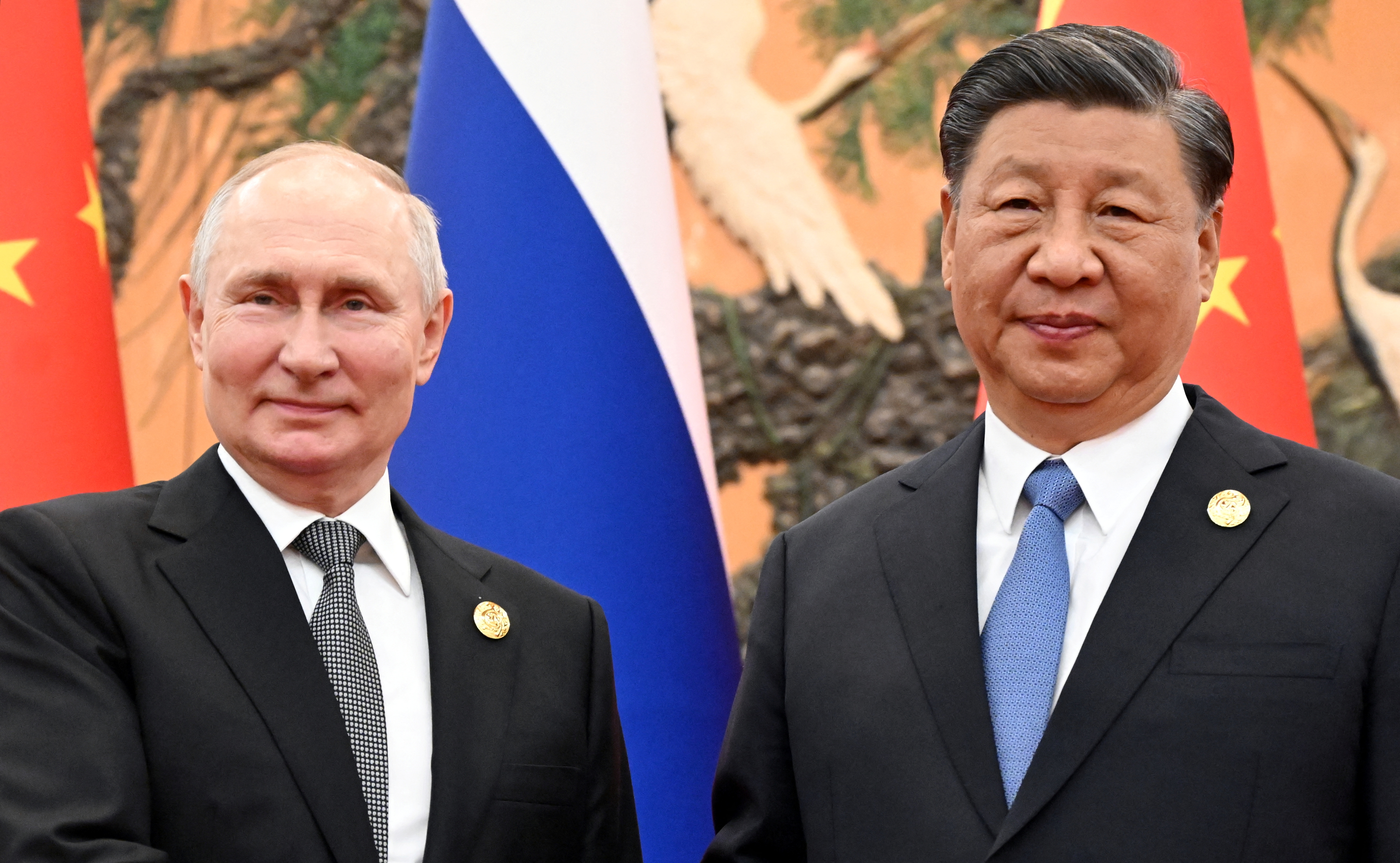
Sign up here.
Reporting by Reuters
Our Standards: The Thomson Reuters Trust Principles. New Tab , opens new tab
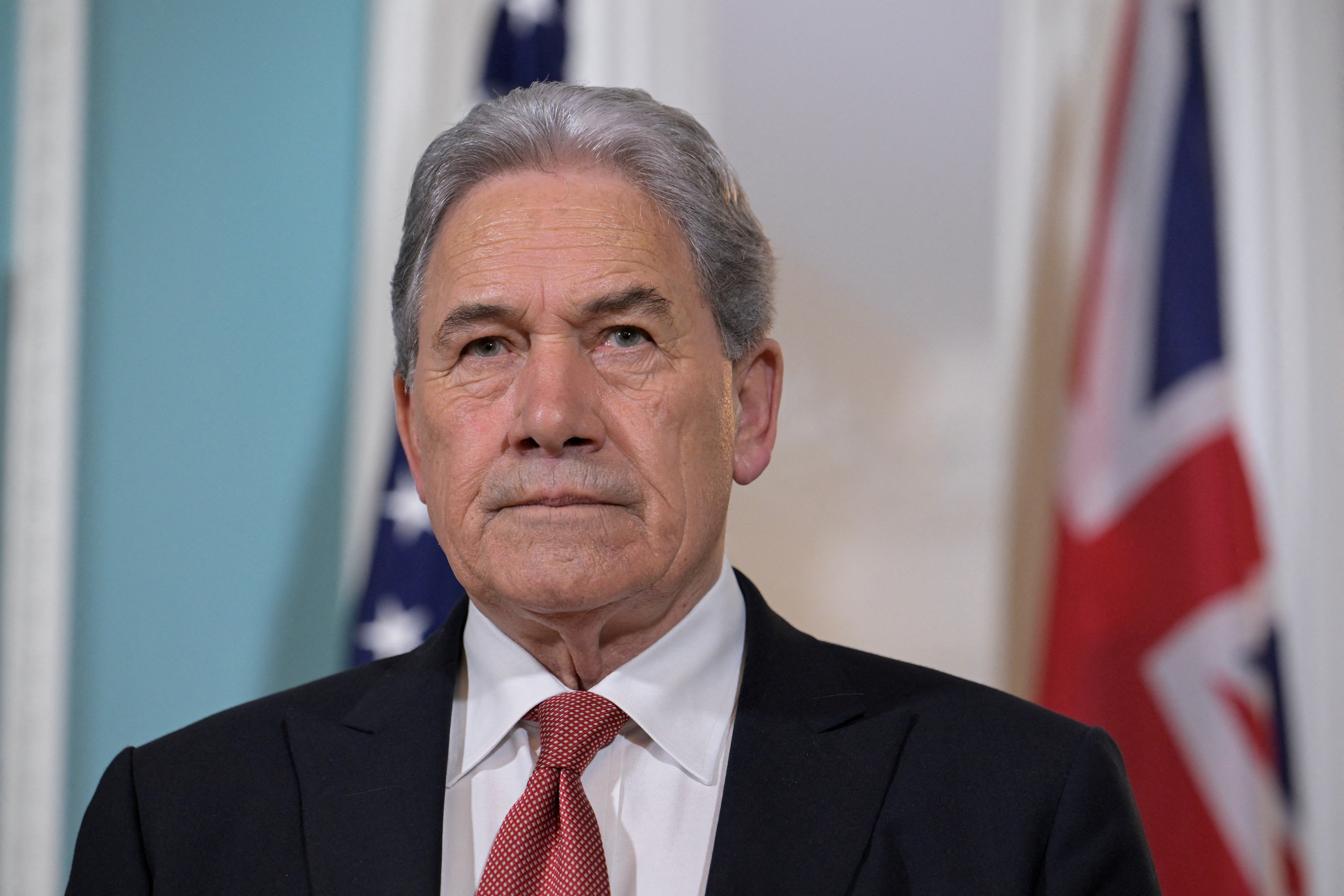
World Chevron

Death toll from rains in southern Brazil climbs to 29, Lula visits region
The death toll from heavy rains in Brazil's southernmost state of Rio Grande do Sul rose to 29, local authorities said on Thursday evening, as the state government declared a state of public calamity to handle the dramatic situation.
The Islamic Resistance in Iraq, a group of Iran-backed armed groups, launched multiple attacks on Israel using cruise missiles on Thursday, a source in the group said.


Putin says plans to visit China in May
R ussian President Vladimir Putin said Thursday he plans to visit China in May, his first planned trip abroad since re-election as Moscow seeks deeper ties with Beijing.
The West has viewed Russia and China with increased anxiety over the past two years as they boost military co-operation and seek to expand their global influence.
"A visit in May is planned," Putin said at a business forum in Moscow, without providing further detail. The Russian leader last visited China in October 2023.
Days before Russia launched its full-scale military assault on Ukraine in February 2022, Beijing and Moscow declared a "no limits" partnership and have since boosted trade to record highs.
Moscow has looked to China as a crucial economic lifeline since the West hit Russia with unprecedented sanctions over its military offensive.
China has meanwhile benefited from cheap Russian energy imports and access to vast natural resources, including steady gas shipments via the Power of Siberia pipeline.
But their close economic partnership has come under close scrutiny in the West, which has threatened to sanction overseas banks and companies that work with Moscow.
The Izvestia newspaper reported in March that Chinese lenders Ping An Bank and Bank of Ningbo had stopped accepting payments in Chinese yuan from Russia, alongside several smaller banks.
The Kremlin admitted there were some problems with cross-border transactions, but said the West was to blame for putting "unprecedented pressure" on Chinese firms.
- 'Interference' -
Putin's announcement came shortly after US Secretary of State Antony Blinken landed in Beijing, in part to defuse tensions with the rival power.
Both Beijing and Moscow have been outspoken in their criticism of the United States.
Chinese President Xi Jinping and Putin in February accused Washington of "interfering" in their countries' affairs during a telephone call.
Beijing has refused to condemn Moscow's Ukraine offensive, instead offering itself as a potential mediator between the two sides.
Earlier this month, Russian Foreign Minister Sergei Lavrov said China's peace plan, which critics have called "vague", was the most reasonable any country had put forward.
"This plan has been criticised for being unspecific... But it is a reasonable plan that the great Chinese civilisation has put forward for discussion," Lavrov said.
China has itself been criticised by the United States over a number of thorny issues, including increasingly belligerent behaviour toward self-ruled democratic Taiwan, which Beijing claims as its territory.
Most recently, tensions have grown over Washington's move to ban the popular social media app TikTok, which is owned by Chinese company ByteDance.
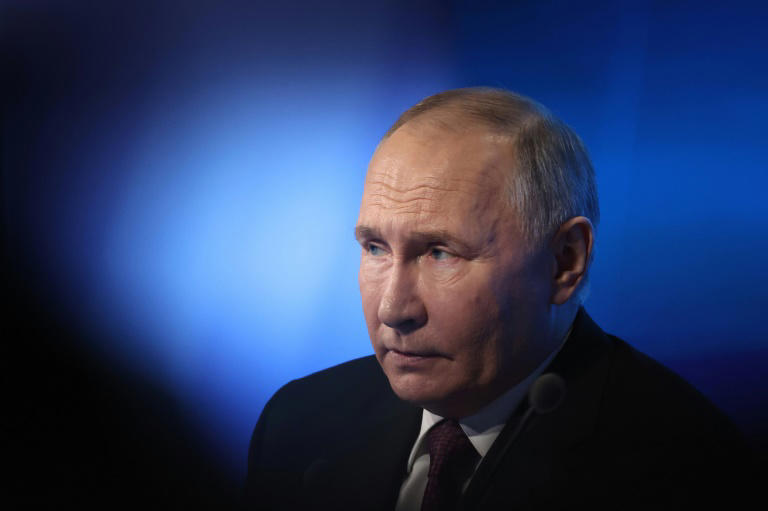

Bolivian Foreign Minister begins official program in China
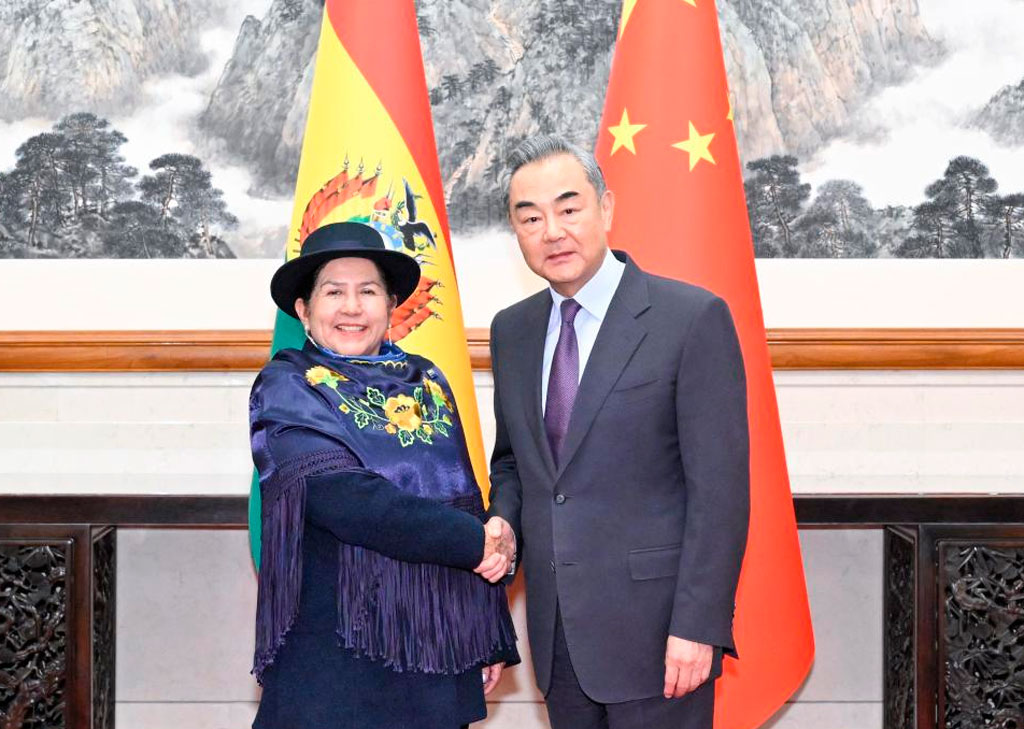
- April 29, 2024
The Chinese Foreign Ministry confirmed that the minister will visit the cities of Beijing and Shanghai from this Monday until April 30th to strengthen bilateral relations and promote cooperation in strategic spheres.
During her stay in China, Sosa will address an agenda that includes cooperation issues in areas such as tourism, technology, energy, and other sectors of mutual interest.
China and Bolivia consider this an important milestone on the international agenda, regarding diplomatic ties between both States, strengthened by talks at the highest levels.
The Foreign Minister’s visit to China has as its immediate precedent her official visit to Russia and reaffirms Bolivia’s commitment to strengthening cooperation and constructive dialogue on the global stage. Speaking at the Chinese embassy in La Paz, Sosa reassured the commitment to consolidate bilateral ties with this country she described as a sister nation.
Sosa highlighted that the Government of President Luis Arce is characterized by the construction of the economy for living well towards industrialization with import substitution, and mentioned in this regard the agreements signed between Chinese companies and Bolivian Lithium Deposits.
China’s ambassador to Bolivia, Wang Liang, in turn, highlighted the strategic relationship which is experiencing sustainable and stable development between the two nations, contributing to the consolidation of Bolivia’s economy. “We are satisfied with the close collaboration and reciprocal support maintained by both parties on relevant issues on the international agenda (…),” the diplomat said.
jrr/llp/jf/jpm
- # ALBATCP # BOLIVIA # China
Angola’s International Tourism Exchange seeks to promote sector
- May 2, 2024
Bolivia’s International Reserves soar in 1Q 2024
Cuba demands palestinian membership to un, colombian avianca airline announces flights to havana in july.
| Text SMS to 8100 with content PL Receive 4 mesages x 25 cup
© 2016-2021 Prensa Latina Latin American News Agency
Radio – Publications – Videos – News by the minute. All Rigts Reserved.
St. E No 454 , Vedado, Habana, Cuba. Phones: (+53) 7 838 3496, (+53) 7 838 3497, (+53) 7 838 3498, (+53) 7 838 3499 Prensa Latina © 2021 .
Web Site developed by IT Division Prensa Latina.


COMMENTS
The last stop of a four-nation tour saw Chinese President Xi Jinping visit Cuban President Raul Castro in Havana.After reviewing Cuba's Honour Guard at the P...
When Secretary of State Antony Blinken visited China this week, he raised concerns about China's military and intelligence activities in Cuba. The Wall Street Journal has run a series of articles ...
China's President Xi Jinping has pledged to support Cuba's defence of its national sovereignty, opposing foreign interference and a U.S. economic blockade, and will expand strategic coordination ...
Cuba was included in the first group of nations that Chinese citizens could visit after the Covid-19 pandemic, while the promotional video of the Cuba Unica campaign won the first place in the ...
BEIJING, Nov 21 (Reuters) - Cuba's President Miguel Díaz-Canel will visit China from Nov. 24-26, Chinese state media reported on Monday. At the invitation of President Xi Jinping, Díaz-Canel ...
The state visit by Cuban President Miguel Diaz-Canel to China, is a strategic, constructive visit with important signs. Here is a summary of the results of the meeting between the presidents of Cuba and China on November 25. As the two nations adhere to the socialist path, China and Cuba have had robust ties since diplomatic relations were ...
This is the second time that Che Guevara visited China, the first time being November 1960. Cuban-Chinese relations are the interstate relations between the People's Republic of China and Republic of Cuba. The origins of the relations began when the Qing dynasty established a consulate in Havana while Cuba was a still a colony of Spain in 1879.
The two sides also witnessed the signing of a memorandum of understanding on cooperation between China's National Commission of Supervision and the Office of the Comptroller General of Cuba. Li paid an official friendly visit to Cuba from Saturday to Monday. READ MORE: Cuban summit calls for global multilateralism
"China and Cuba are good friends walking hand in hand, and good comrades who have similar ideals and beliefs," Wang said. China is willing to work with Cuba to take this visit as an opportunity to deepen the special friendly relations between China and Cuba in the new era, and to jointly build a community with a shared future with Cuba, Wang added.
Diaz-Canel is the first head of state from Latin America and Caribbean region to visit China after the 20th CPC National Congress. It is believed that his visit will inject impetus for bilateral ...
China-Cuba ties, a time-honored friendship, face a new historic chapter, with the state visit of Miguel Díaz-Canel, First Secretary of the Central Committee of the Communist Party of Cuba and ...
BEIJING, Nov. 21 (Xinhua) -- The Cuban president's upcoming visit to China is expected to inject new impetus into bilateral relations and promote the traditional friendship and sound cooperation ...
The state visit of Miguel Díaz-Canel, First Secretary of the Central Committee of the Communist Party of Cuba and Cuban President, marks a new historic chapter in China-Cuba relations. As the two countries plan the development of their cooperation against the background of the COVID-19 pandemic and global uncertainties, we discuss the existing ...
China and Cuba are joining together to build a Sino-Cuban community of shared future, injecting an important impetus to the development of bilateral relations. They are two good friends, close partners and intimate brothers. ... Miguel Díaz-Canel Bermúdez, who was in Beijing on a state visit. ...
Cuban President Miguel Diaz-Canel will visit Beijing, where he is expected to meet President Xi Jinping, as the final stop on a mission to secure support for crisis-stricken Caribbean country.
China and the United States routinely spy on one another's activities, and Cuba proximity has long made it a strategically valuable foothold for U.S. adversaries, perhaps most famously during ...
He said that the visit is an opportunity to deepen the special friendly relations between China and Cuba in the new era and jointly build a China-Cuba community with a shared future. Wang added that Marrero's stay gives continuity to high-level exchanges between the two nations and in particular mentioned the latest meetings between presidents ...
China's role in helping the regime cut off communications during the protests has exposed one of the many ways Beijing helps keep the Cuban communist regime afloat. China's Interests in Cuba ...
US Secretary of State Antony Blinken "made very clear" during his meetings in Beijing this week that the United States "would have deep concerns" about China increasing its intelligence or ...
China has been operating military and intelligence facilities in Cuba since at least 2019 and is continuing to expand its intelligence gathering capabilities around the world, a Biden ...
Reuters in Washington. Thu 8 Jun 2023 16.07 EDT. First published on Thu 8 Jun 2023 12.25 EDT. China has reached a secret deal with Cuba to establish an electronic eavesdropping facility on the ...
An aerial view of the Cuban city of Havana in August 2017. Cuba has agreed to allow China to build a spying facility on the island that could allow the Chinese to eavesdrop on electronic ...
China is planning to build a facility in Cuba that U.S. officials are concerned could be capable of spying on the United States by intercepting electronic signals from nearby U.S. military and ...
Cuba gets $100M from China to help survive economic crisis. Donation announcement comes as Cuban President Miguel Diaz-Canel concludes a visit to Beijing, part of a rare foreign trip.
Cuba was not a failed state in 2021, nor is it now—but its economy is failing under the combined weight of U.S. sanctions, misguided government policies, and the aftereffects of the COVID-19 ...
Russian President Vladimir Putin said Thursday he plans to visit China in May, in what could become the first foreign trip for the Russian leader after he extended his rule by six more years in an election that offered voters little real choice.. Putin announced the plans for the visit at a congress of the Russian Union of Industrialists and Entrepreneurs in Moscow.
Musk's visit coincides with the Beijing auto show, which opened last week and ends on 4 May. Tesla does not have a booth at China's largest car show and last attended in 2021.
The trip is likely to be the first overseas visit of Putin's new six-year term, following an election in March. He last visited China in October 2023.
Russian President Vladimir Putin said Thursday he plans to visit China in May, his first planned trip abroad since re-election as Moscow seeks deeper ties with Beijing. "A visit in May is planned ...
La Paz, Apr 29 (Prensa Latina) The Minister of Foreign Affairs of Bolivia, Celinda Sosa, began an official visit to the People's Republic of China in compliance with an invitation from her ...